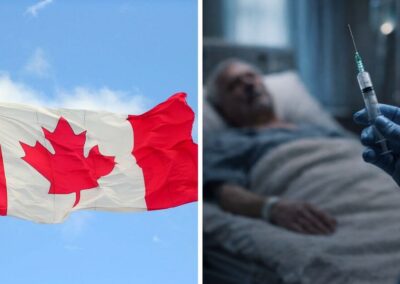Game of Thrones actress Sophie Turner has called on Peers to “pause” the assisted suicide Bill, raising concerns about the harm it could cause to people with eating disorders.
As the Terminally Ill Adults (End of Life) Bill is examined in the Lords at Committee stage, the 29-year-old actress, who herself has suffered from an eating disorder, has signed an open letter warning that the Bill “could make individuals with eating disorders eligible for assisted death at times when they are unable to access or accept treatment”.
“Many young people who could recover with effective care might instead receive lethal medication during a period of despair”, the letter goes on. The Bill poses a “serious risk” to people with eating disorders, the letter says.
The letter, coordinated by a leading eating disorder charity, Eat Breathe Thrive, and signed by Mind, one of the UK’s biggest mental health charities, has also been signed by Gail Porter, the TV personality, and Stephanie Waring, the former Hollyoaks actress, both of whom have struggled with eating disorders.
The letter highlights international evidence that women with eating disorders have already had their lives ended by assisted suicide or euthanasia under laws similar to the proposed legislation in England and Wales. In one case, a woman named Jessica, a 36-year-old from Colorado with anorexia and depression, who was unable to increase her nutritional intake, was prescribed lethal drugs after her doctor deemed her illness incurable.
“According to her family, she repeatedly said she did not want to die but could not continue living as she was”, the letter says.
Women with eating disorders have already died under assisted dying legislation
Chelsea Roff, the founder of Eat Breathe Thrive, previously published a study that identified “at least 60 patients with EDs who underwent assisted dying between 2012 and 2024” in countries with assisted suicide and/or euthanasia.
The letter states they “were not individuals who were inevitably dying, but individuals whose illnesses had become life-threatening in the absence of effective treatment”.
The letter warns that the Bill’s definition of “terminally ill” could be interpreted to include people with eating disorders who develop severe complications from starvation, vomiting or, in those cases in which someone has Type 1 diabetes, insulin restriction.
“In a health system already stretched beyond capacity, someone who is severely ill and ambivalent about treatment could be assessed as eligible for assisted death”, the letter says.
The letter urges Peers “to pause and ensure that legislation intended to bring compassion to those facing terminal illness does not end the lives of those who could still recover”.
One of the letter’s signatories, Gail Porter, said “The evidence from abroad cannot be brushed aside. People with eating disorders deserve support to live, and I worry this bill could end the lives of young people who need support to recover, not assistance to die”.
Actress Stephanie Waring said “When you are unwell, you can feel hopeless, frightened, and convinced there is no way out. People need treatment and understanding, not help to end their lives”.
According to the Oregon Health Authority (2021), anorexia is listed as one of the “underlying illnesses” of people who ended their lives by assisted suicide in Oregon, though the precise number of people who ended their lives with this underlying illness is unknown.
The open letter comes just days after almost a thousand amendments were tabled to the assisted suicide Bill, believed to be approaching a record number, as the Bill entered Committee stage in the House of Lords.
The number of amendments tabled appears to reflect the unprecedented interest Peers have taken at every stage of this Bill. It follows over 200 Peers putting their names down to speak at Second Reading, identified as a Parliamentary record by The Times.
The Terminally Ill Adults (End of Life) Bill, which would legalise assisted suicide in England and Wales for those with a prognosis of six months or less, has faced extensive criticism in the House of Lords, with over two-thirds of Peers who took a position on the Bill speaking against it during second reading.
A total of 957 amendments to the assisted suicide Bill have been tabled. This is believed to be approaching a record number, with Matthew England, a researcher at the Hansard Society, highlighting that over the last decade, no other bill has had more than around 750 amendments at this stage.
Amendments have been tabled or sponsored by 57 separate peers, who come from all sides of the House and both sides of the argument. Lord Falconer, the Bill’s Sponsor, has himself tabled 35 of the amendments.
Amendments can be tabled right up to the final sitting of the committee, meaning this number could become even higher.
Spokesperson for Right To Life UK, Catherine Robinson, said “The assisted suicide Bill poses a clear threat to the lives of people with eating disorders”.
“Our culture should not be facilitating suicide for a certain segment of the population or introducing legislation that could, presumably unintentionally, permit assistance in suicide for people with eating disorders. Instead, we should do all we can to provide assistance to live, not to die. This Bill is a disaster in waiting”.












